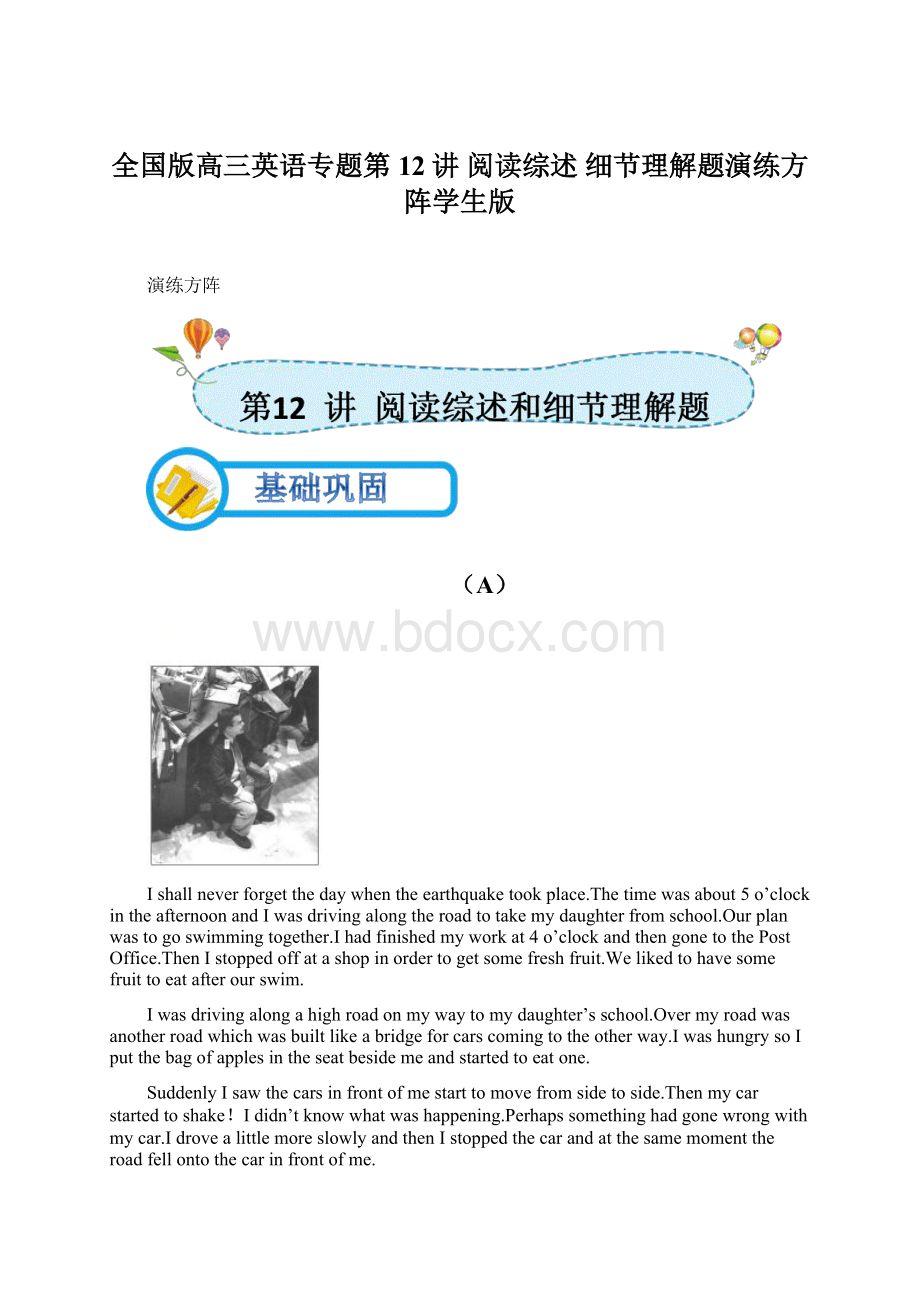全国版高三英语专题第12讲 阅读综述 细节理解题演练方阵学生版Word下载.docx
《全国版高三英语专题第12讲 阅读综述 细节理解题演练方阵学生版Word下载.docx》由会员分享,可在线阅读,更多相关《全国版高三英语专题第12讲 阅读综述 细节理解题演练方阵学生版Word下载.docx(11页珍藏版)》请在冰豆网上搜索。

hadcometoseeifanyonewasunderthebrokenroad.Icalledout,“I’mhere!
”Iheardashout.Soonastrangerclimbedtothesideoftheroadnearmycar.“Howareyoudoing?
”heasked.
“Nottoobad,”Isaid,“Butmyfeetandlegsfeelasifthey’rebroken.”“We’llhaveyououtoftherejustassoonaswecan.”Theydidn’tgetmeoutuntilthenextmorning.Ihadbeeninmycarforfourteenhours.
1.Whentheearthquaketookplace,thewriterwas.
A.onhiswaytothePostOfficeB.stoppingoffatashop
C.doingsomeshoppingD.underaroadbuiltlikeabridge2.Thewriter’scarbegantomovefromsidetosidebecause.
A.therewassomethingwrongwithhiscar
B.heateapplesashedrove
C.anearthquakebegantohappen
D.hedrovetoofast
3.WhichofthefollowingisTrueaccordingtothepassage?
A.Whentheearthquakehappened,thewriterwaswithhisdaughtertogether.
B.Thewriter’slegsandfeetwerebadlywoundedintheearthquake.
C.Thewriterwassavedassoonasthestrangerclimbeduptheroad.
D.Thewriterwassofrightenedthatheforgoteverythingthathappenedaroundhim.
4.Whichofthefollowingshowstherightorderofwhathappenedtothewriter?
a—Astrangerclimbedtothesideofroadnearhiscarandaskedhowhewasgoing.b—Thewriterfinishedhiswork.
c—Hefelthiscarshakingonhiswaytohisdaughter’sschool.d—Heboughtsomefreshfruitinashop.
e—Hewassavedthenextmorning.f—Thewriterfoundhimselfinthedark.g—HewenttothePostOffice.
A.b,g,d,c,f,a,eB.b,d,c,g,f,a,e
C.d,b,c,f,g,a,eD.c,a,f,g,b,d,e
(B)
TheAdlerPlanetariumChicagoishometomorethan35,000squarefeetofexhibits.FromhugemodelsoftheSolarSystem,toancientastronomicalinstruments,tointeractiveadventures,Adler’sexhibitgalleriesprovidesapassagewayforyoutoexploretheuniverse.TheAdleralsooffersminiscienceexplorationactivitiesthatarequick10-minutelessons.Visitorscanlearnsomeinterestingastronomicalfactsatthesesmallactivitycarts.
TheAdlerPlanetariumChicagoistheonlymuseumintheworldwithtwofull-sizeplanetariumtheaters.Since1930,thewonderofthestarshasbeenvisibleinthehistoricSkyTheater.PoweredbybrandnewDigistar3TMtechnology,theStarRiderTheaterisacompletelydigital,virtual(虚拟的)outerspaceenvironment.ThefamousZeissPlanetariumprojectorisabletoaccuratelyreproducethemovementofeveryaspectofthenightsky.
Do’sandDon’ts:
DoTaketheBus/Train:
Leavethecarathomeforthismuseumtrip.TheAdlerislocatedwithincloseproximitytopublictransit.
Don’tMisstheDoaneObservatory:
Whenweatherpermits,theDoaneisopenattheAdlerforobservingwithits20-inchdiametertelescope.
Don’tMissMuseumSpecialEvents:
TheAdleroffersasummercampforkidsfrommidJunetoAugust.
TicketPrice:
Adult:
$28;
child:
$22.BookonlinenowtoSave37%.RegularSchedule:
Mon.—Fri.10am—4pm;
Sat.—Sun.10am—4:
30pm.SummerHours:
9:
30am—6pmdaily.
NearestTransit:
RooseveltMetroStation
Address:
1300SLakeShoreDr,Chicago,IL60605
1.What’sthemainfunctionoftheAdlerPlanetariumChicago?
A.DisplayingthemodelsoftheSolarSystem.
B.Sellingancientastronomicalinstruments.
C.Offeringapassagewaytoexploretheuniverse.
D.Giving10-minutelessonstovisitors.
2.WhatcanvisitorslearnintheStarRiderTheater?
A.ThehistoryoftheAdlerPlanetariumChicago.
B.Thewonderoftheinteractiveadventures.
C.ThecomplicatedDigistar3TMtechnology.
D.Themovementofthestarsinthenightsky.
3.IfyouwanttotrytheDoaneObservatory,you’dbetter.
A.driveyourprivatecar
B.considerweatherconditions
C.buyatelescopeinadvance
D.jointheAdler’ssummercamp
4.HowmuchwillacoupleandtwokidsatleastspendtovisittheAdler?
A.$37.B.$63.C.$72.D.$100.
(C)
Inthefaceofthetensionsandpressuresweallfaceeverysingleday,asenseofhumorcanbehelpful.Theabilitytolaughisveryimportanttoourfullestdevelopmentandtoour“mentalhealth”.Andifwecanlaughatourselves,we’reevenfurtheralongtheroadtoself-fulfillment.Considerthefollowingexample.
Gordonishopingtobecomeaprofessionalsinger.Hehasagoodvoice,andhasperformedinpublicmanytimes.Buthe’sverysensitiveabouthisabilities.Forinstance,ifhisvoicecoachsuggestshepracticeaparticularsongafewmoretimesuntilhegetsitright,Gordonfallsapart,absolutelycertainthatthecoachisimplyingthatheisn’tanygoodandhehasnofutureinmusic.
Hementionedhissensitivityinhispaperforapsychologyclass.Thepsychologyprofessorcalledhimin,outwardlytotalkaboutthepaper,buthopingtogivetheboyachancetoopenupabouttheproblem.Theteacherrarelytoldherstudentswhattheyoughttodo,butshefeltGordonshouldknowthatsuchextremesensitivitywouldmakeitdifficultforhimintheentertainmentfield,wherestagepersonnel,andfellowperformersoftenareveryhardonnewtalent.SheaskedGordonifhefelthehadmadenecessarypreparationstofollowthroughinsuchacompetitiveanddifficultbusiness.
Gordongotangrywiththeteacher,pointingabravefingerather,andtoldhershewas“deadwrong”abouthim.Further,Gordonaskedwhatshecouldpossiblyknowaboutmusicandthepressuresoftheprofession.TheteacherstoodupandturnedGordonaround,rightinthemiddleofasentence,askinghimtocontinue,buttowatchhimselfinthemirroronthebackoftheofficedoorashetalked.Gordontriedtogoon,pointingandgesticulating,butsuddenlyhesawhisexpressioninthemirror,thenwhenheturnedtofacethepsychologist,henoticedasmilebeginningtoformontheteacher’sface.Attheverytopofhis“outburst,”Gordonburstoutlaughing.Hestoppedhisaggressivetalkandaskedtheteacherifhelookedthatridiculousallthetime.
Seeinghimself“objectively”madeGordonrealizethathowridiculousitwastotakehimselfsoseriously.Inoureverydaylife,theabilitytocatchourselvesbeingsoserious,bearingalltheburdensoftheworld,andtryingtosavethehumanracehelpsusrelievesomebuilt-uptensionthroughlaughter.
Laughterisanecessarypartofmentalhealth.Laughterisoneofthewaysinwhichwerelaxandrecreatetheselfhood.Thethingswefindinhumormayvary,buttheexperiencesofhumor,pleasure,andenjoymentareextremelyimportantandmustbefostered.
1.Fromthefirsttwoparagraphs,wecanlearnthatGordon.
A.hasbrokenupwithhiscoach
B.hasfailedtobeaprofessionalsinger
C.keepspracticingandhopesforthebest
D.feelsverysensitivetootherpeople’scomments
2.WhydidthepsychologisttalkwithGordon?
A.Todiscusshispaperwithhim.
B.Tohelphimrealizehisproblem.
C.Topointouthisrudebehaviors.
D.Toofferadviceonreducingpressure.
3.Howdoestheauthorsupporthisideas?
A.Byofferinganalyses.B.Byprovidingresearchresults.
C.Bygivinganexample.D.Bystatinganargument.
(D)
Wewouldallliketoincreaseourcognitive(认知的)abilitybeyondthelimitsset
byMotherNature.Soit’snowonderthatbrain-trainingprogrammes–whichtypicallyfocusontrainingourworkingmemory–areamultibillion-dollarindustry.Butcanthiskindoftrainingreallymakeussmarter?
Cognitivetrainingseesthebrainasakindofmusclethatcanbemadestrongerwiththerightkindofpractice.Itconsistsoftasksorgamescarriedoutoncomputersorsmartphones.Despitemuchresearch,therehassofarbeennoagreementaboutitseffectiveness.Somethinkthatcognitivetrainingincreasesabroadrangeofcognitiveabilities,whileotherslessoptimistic.
Yetwedoknowthatsomecognitiveskills,suchasworkingmemoryandintelligence,tendtogotogetherandarepredictorsofreal-lifeskillssuchasworkperformance.Thus,trainingonecognitiveskillmightleadtoanimprovementinmanyothercognitiveandnon-cognitiveskills.Thatisexactlytheunderlyinghypothesis(假设)onwhichworking-memorytrainingisbased.
Totestthishypothesis,weexaminedallthestudiesaboutworking-memorytrainingwecouldfindwithnormallydevelopingchildren:
26experimentsand1,601totalparticipants.Childrenrepresentanidealtestgroup:
duringchildhood,skillsarestillatthebeginningoftheirdevelopment.Thus,cognitivetrainingismorelikelytosucceedwithchild